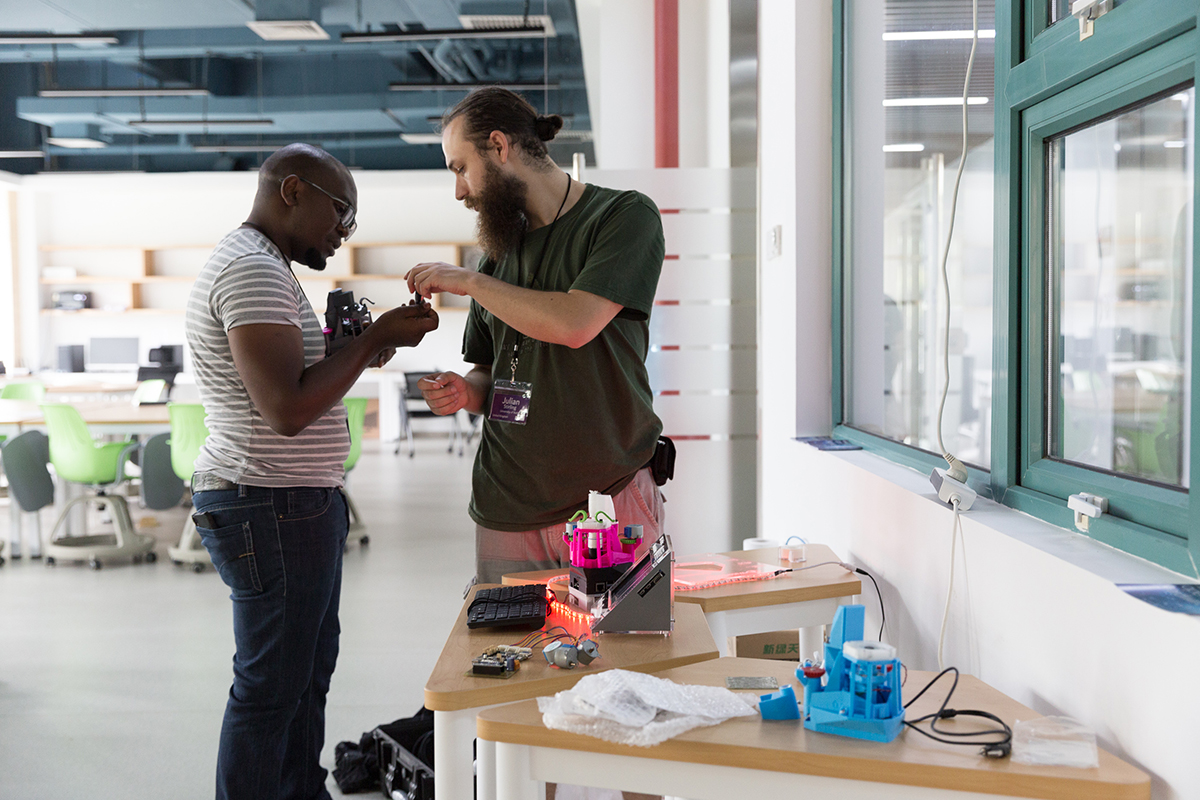Open Science Hardware Accelerates Innovation, Democratizes Science
By Alli Fossner
July 29, 2021
Open Science Hardware (OSH)—a term used to describe openly licensed scientific tools that are available for anyone to study, modify, reproduce and distribute—is going to happen. The question that Julieta Arancio, a postdoctoral researcher at Drexel University, is trying to answer is how.
How will researchers pursue new questions as OSH disrupts the power structures at different levels of academia? How will academic incentives promote or hinder the expansion of OSH? How can OSH increase the knowledge production in marginalized or low-resource communities, specifically in the Global South?
Open Science Hardware is a field that is new and rapidly changing. Much like open-source software upended the top-down model of proprietary technologies for developers, OSH is now on the same pathway in changing how scientists think. Arancio is hoping to help understand the processes that can support this endeavor.
Under the mentorship of Gwen Ottinger, associate professor in the Center for Science, Technology and Society and the Department of Politics, Arancio will seek answers to these questions by studying the OpenFlexure Project, an initiative between University of Bath in the UK and Bongo Tech & Research Labs (ex-STICLab makerspace) in Tanzania. She will use her findings to develop policy recommendations for university management, researchers and anyone trying to promote this transformative process.
The OpenFlexure microscope is a customizable optical microscope that is high-performance and low cost, and deemed a “star” of OSH. The project is particularly interesting because of the co-development process that took place between the United Kingdom and Tanzania, where Arancio will mostly split her time over the next two years.
“The new version of the microscope responds to the needs of the user in Tanzania, which are very different [than the needs of researchers in the UK],” says Arancio. “The dialogues that happened between the UK and Tanzania allowed for one of the most valuable things that I think OpenFlexure has, which is a completely closed local circuit of production of the science equipment. That is quite transformative. I think OpenFlexure is a great case to understand what they did right.”
 Julieta Arancio
Julieta Arancio
The closed local circuit of production means the OF microscope can be completely built and repaired in Tanzania, at significantly lower costs. Another success story of OSH comes from the Peruvian Amazon, where researchers from Universidad Peruana Cayetano Heredia could not import a device strong enough to survive the harsh weather conditions. Enter the Gorgas tracker, a modification of an available open-source phone, a highly-customized device that fits the needs of the researchers.
But the beauty of OSH isn’t only in its ability to create equipment for researchers. The transformational nature of OSH is in its capacity to open doors for anyone—social scientists, economists, artists, entrepreneurs. Technology is no longer limiting. You can take a tool from any field and customize it to your needs. At the second global gathering of the GOSH held in Chile in 2017, that diversity and interdisciplinary work is what drew Arancio in and allowed her to see its potential effect on the world.
“The conversations were deep, and what interested me most was that the people there wanted to change the world,” recalls Arancio. “They wanted to change the way things were happening in knowledge production, both in academia and outside it. The diversity of people that need tools to produce knowledge is amazing, and they're finding openness as an enabler of their own projects and a way to materialize their needs and their ideas.”
OSH aligns perfectly with Drexel’s commitment to be “the most civically engaged university in the United States” because it puts the power into the hands of people, allowing them to ask new questions about their communities. Ottinger’s work also aligns with OSH, as she studies environmental justice communities’ efforts to generate data about environmental issues that directly affect them.
 Julian Stirling (right), from University of Bath, and Valerian Sanga, from Bongo Tech and Research Labs, assemble OpenFlexure Microscopes for display at GOSH Global 2018. Photo courtesy OpenFlexure Project.
Julian Stirling (right), from University of Bath, and Valerian Sanga, from Bongo Tech and Research Labs, assemble OpenFlexure Microscopes for display at GOSH Global 2018. Photo courtesy OpenFlexure Project.
“One of the fundamentals of Open Science Hardware that I consider transformative is the disruption of the established power relations in knowledge production,” says Arancio. “We have already seen many initiatives around the world using Open Science Hardware. For example, in cases of environmental injustice, trying to empower communities to produce their own data, to try to improve the situations they are immersed in. This is what interests me most because it has the potential to enable those contacts with the community in a different way.”
Arancio points to Public Lab, a non-profit that democratizes science to address environmental issues that affect people, creating tools that are low cost, open source and built through public participation. On the board of Public Lab, Ottinger’s research seeks to use innovation to promote social justice.
“Our common interest lies in democratizing science so that the questions that get asked aren't just questions interesting to people who have scientific credentials,” agrees Ottinger.
“There is a lot of work to do in building the necessary infrastructures to support OSH expansion,” says Arancio. “There’s very conscious work that the community is currently doing. How do we make Open Science Hardware without reproducing the same pattern of inequity, for example between the North and South, or inside and outside academia? In my opinion, openness should be much more than ‘business-as-usual, but now we are open.’"
“Each version [of the OpenFlexure microscope] represents a configuration of users, of a particular context, of a particular need, and that’s how I think technology should be situated,” she continues. “You use technology for your own purpose, and you should be able to customize it, repair it if you need to and want to. You should not be limited by technology and what you can do with what someone else thought for you somewhere else; our role as users doesn’t have to be so passive.”